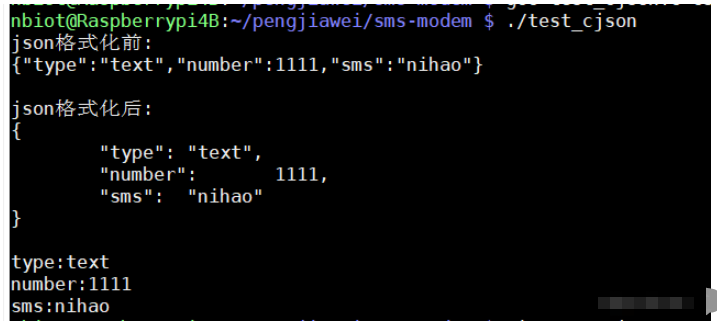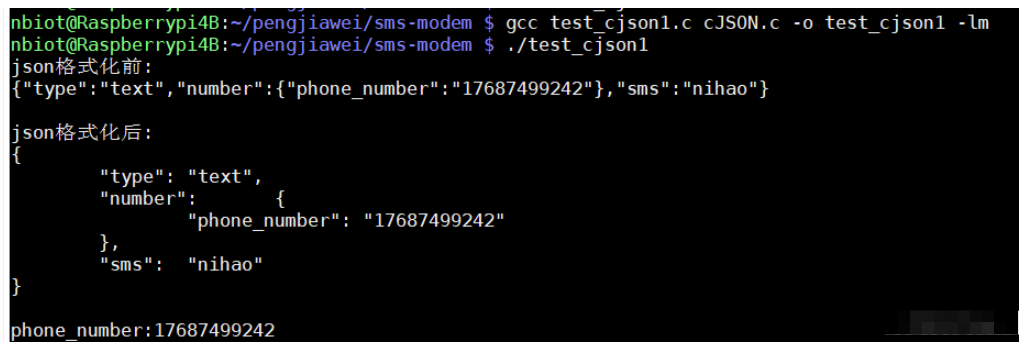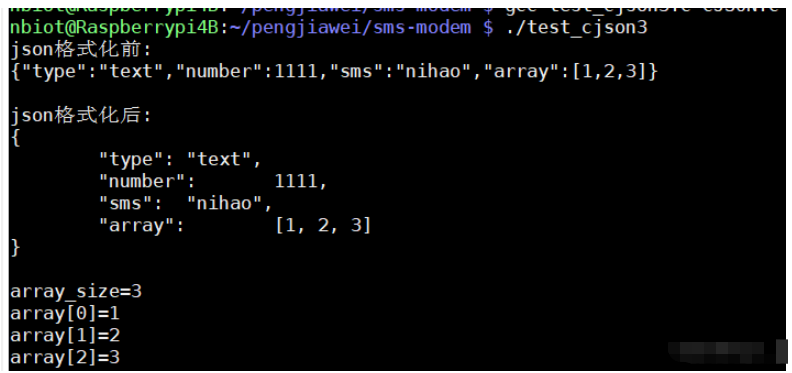您好,登錄后才能下訂單哦!
您好,登錄后才能下訂單哦!
這篇文章主要介紹“C語言怎么用cJSON解析JSON格式”,在日常操作中,相信很多人在C語言怎么用cJSON解析JSON格式問題上存在疑惑,小編查閱了各式資料,整理出簡單好用的操作方法,希望對大家解答”C語言怎么用cJSON解析JSON格式”的疑惑有所幫助!接下來,請跟著小編一起來學習吧!
語法:鍵 / 值
1、以 { 開始,以 } 結束,允許嵌套使用
2、每個鍵和值成對出現,并使用:分隔。如"age"=23
3、鍵值對之間用 ,分隔
值的多種類型:
字符串:用 " "
{
"name":"code",
"gender":"male"
}數字:整數或浮點數都直接表示
{
"key1":10,
"key2":20.0
}數組:用[ ]
{
"key1" : [0, 1],
"key2" : [2, 3]
}布爾值:fault、true
git clone https://gitee.com/peng-jiaweibabe/c-json.git
cJSON的.c和.h文件,使用的時候,只需要將這兩個文件復制到工程目錄,然后包含頭文件cJSON.h即可。即#include "cJSON.h"
如若出現該情況,鏈接math庫即可

CJSON_PUBLIC(cJSON *) cJSON_Parse(const char *value)
函數功能:將一個JSON字符串,按照cJSON結構體的結構序列化整個數據包,并在堆中開辟一塊內存存儲cJSON結構體
返回值:成功返回一個指向內存塊中的cJSON的指針,失敗返回NULL
CJSON_PUBLIC(char *) cJSON_Print(const cJSON *item) //按JSON格式打印
CJSON_PUBLIC(char *) cJSON_PrintUnformatted(const cJSON *item) //不按JSON格式打印
函數功能:將整條鏈表中存放的JSON信息輸出到一個字符串中,使用時只需用一個字符串指針(char *)接收該函數返回的指針地址即可。
返回值:成功返回一個char*指針并指向位于堆中JSON字符串,失敗返回NULL
CJSON_PUBLIC(void) cJSON_Delete(cJSON *c)
函數功能:釋放位于堆中cJSON結構體內存
返回值:無
(cJSON *) cJSON_GetObjectItem(const cJSON * const object, const char * const string)
函數功能:根據鍵值對的名稱從鏈表中取出對應的值,返回該鍵值對(鏈表節點)的地址
返回值:成功返回一個指向內存塊中的cJSON的指針,失敗返回NULL
CJSON_PUBLIC(cJSON *) cJSON_GetObjectItem(const cJSON * const object, const char * const string) (int) cJSON_GetArraySize(const cJSON *array) (cJSON *) cJSON_GetArrayItem(const cJSON *array, int index)
/* raw json */ CJSON_PUBLIC(cJSON *) cJSON_CreateRaw(const char *raw); CJSON_PUBLIC(cJSON *) cJSON_CreateArray(void); CJSON_PUBLIC(cJSON *) cJSON_CreateObject(void); /* These calls create a cJSON item of the appropriate type. */ CJSON_PUBLIC(cJSON *) cJSON_CreateNull(void); CJSON_PUBLIC(cJSON *) cJSON_CreateTrue(void); CJSON_PUBLIC(cJSON *) cJSON_CreateFalse(void); CJSON_PUBLIC(cJSON *) cJSON_CreateBool(cJSON_bool boolean); CJSON_PUBLIC(cJSON *) cJSON_CreateNumber(double num); CJSON_PUBLIC(cJSON *) cJSON_CreateString(const char *string); /* These utilities create an Array of count items. */ CJSON_PUBLIC(cJSON *) cJSON_CreateIntArray(const int *numbers, int count); CJSON_PUBLIC(cJSON *) cJSON_CreateFloatArray(const float *numbers, int count); CJSON_PUBLIC(cJSON *) cJSON_CreateDoubleArray(const double *numbers, int count); CJSON_PUBLIC(cJSON *) cJSON_CreateStringArray(const char **strings, int count);
CJSON_PUBLIC(void) cJSON_AddItemToArray(cJSON *array, cJSON *item); CJSON_PUBLIC(void) cJSON_AddItemToObject(cJSON *object, const char *string, cJSON *item);
CJSON_PUBLIC(cJSON *) cJSON_DetachItemViaPointer(cJSON *parent, cJSON * const item); CJSON_PUBLIC(cJSON *) cJSON_DetachItemFromArray(cJSON *array, int which); CJSON_PUBLIC(void) cJSON_DeleteItemFromArray(cJSON *array, int which); CJSON_PUBLIC(cJSON *) cJSON_DetachItemFromObject(cJSON *object, const char *string); CJSON_PUBLIC(cJSON *) cJSON_DetachItemFromObjectCaseSensitive(cJSON *object, const char *string); CJSON_PUBLIC(void) cJSON_DeleteItemFromObject(cJSON *object, const char *string); CJSON_PUBLIC(void) cJSON_DeleteItemFromObjectCaseSensitive(cJSON *object, const char *string);
/*********************************************************************************
* Copyright: (C) 2022 Nbiot<lingyun@gail.com>
* All rights reserved.
*
* Filename: test_cjson.c
* Description: This file test_cjson.c
*
* Version: 1.0.0(30/05/22)
* Author: Nbiot <lingyun@gail.com>
* ChangeLog: 1, Release initial version on "30/05/22 20:25:49"
*
********************************************************************************/
#include <stdio.h>
#include <string.h>
#include "cJSON.h"
int main (int argc, char **argv)
{
char json_buf[] = "{\"type\":\"text\",\"number\":1111,\"sms\":\"nihao\"}";
cJSON *json = NULL;
cJSON *json_type = NULL;
cJSON *json_num = NULL;
cJSON *json_sms = NULL;
printf("json格式化前:\n");
printf("%s\n\n", json_buf);
json = cJSON_Parse(json_buf); //json格式序列化
if (NULL == json)
{
printf("cJSON_Parse error:%s\n", cJSON_GetErrorPtr());
}
printf("json格式化后:\n");
printf("%s\n\n",cJSON_Print(json));
/* 獲取相應key的value */
json_type = cJSON_GetObjectItem(json, "type");
json_num = cJSON_GetObjectItem(json, "number");
json_sms = cJSON_GetObjectItem(json, "sms");
printf("type:%s\n", json_type->valuestring);
printf("number:%d\n", json_num->valueint);
printf("sms:%s\n", json_sms->valuestring);
cJSON_Delete(json); //釋放cjson結構體內存
return 0;
}結果:

/*********************************************************************************
* Copyright: (C) 2022 Nbiot<lingyun@gail.com>
* All rights reserved.
*
* Filename: test_cjson1.c
* Description: This file test_cjson1.c
*
* Version: 1.0.0(30/05/22)
* Author: Nbiot <lingyun@gail.com>
* ChangeLog: 1, Release initial version on "30/05/22 23:36:09"
*
********************************************************************************/
#include <stdio.h>
#include <string.h>
#include "cJSON.h"
int main (int argc, char **argv)
{
char json_buf[] = "{\"type\":\"text\",\"number\":{\"phone_number\":\"17687499242\"},\"sms\":\"nihao\"}";
cJSON *json = NULL;
cJSON *json_phone_number = NULL;
printf("json格式化前:\n");
printf("%s\n\n", json_buf);
json = cJSON_Parse(json_buf); //json格式序列化
if (NULL == json)
{
printf("cJSON_Parse error:%s\n", cJSON_GetErrorPtr());
}
printf("json格式化后:\n");
printf("%s\n\n",cJSON_Print(json));
/* 獲取相應key的value */
json_phone_number = cJSON_GetObjectItem(json, "number"); //首先獲取第一次鍵值
json_phone_number = cJSON_GetObjectItem(json_phone_number, "phone_number"); //獲取第二層
printf("phone_number:%s\n", json_phone_number->valuestring);
cJSON_Delete(json); //釋放cjson結構體內存
return 0;
}結果:

/*********************************************************************************
* Copyright: (C) 2022 Nbiot<lingyun@gail.com>
* All rights reserved.
*
* Filename: test_cjson3.c
* Description: This file test_cjson3.c
*
* Version: 1.0.0(31/05/22)
* Author: Nbiot <lingyun@gail.com>
* ChangeLog: 1, Release initial version on "31/05/22 00:14:13"
*
********************************************************************************/
#include <stdio.h>
#include <string.h>
#include "cJSON.h"
int main (int argc, char **argv)
{
char json_buf[] = "{\"type\":\"text\",\"number\":1111,\"sms\":\"nihao\",\"array\":[1,2,3]}";
cJSON *json = NULL;
cJSON *json_array = NULL;
int array_size=0;
cJSON *json_array_value = NULL;
printf("json格式化前:\n");
printf("%s\n\n", json_buf);
json = cJSON_Parse(json_buf); //json格式序列化
if (NULL == json)
{
printf("cJSON_Parse error:%s\n", cJSON_GetErrorPtr());
}
printf("json格式化后:\n");
printf("%s\n\n",cJSON_Print(json));
json_array = cJSON_GetObjectItem(json, "array");
array_size = cJSON_GetArraySize(json_array); //獲取數組大小
printf("array_size=%d\n",array_size);
for(int i=0; i<array_size; i++)
{
json_array_value = cJSON_GetArrayItem(json_array, i);
printf("array[%d]=%d\n", i,json_array_value->valueint);
}
cJSON_Delete(json); //釋放cjson結構體內存
return 0;
}結果:

三層鍵值
/*********************************************************************************
* Copyright: (C) 2022 Nbiot<lingyun@gail.com>
* All rights reserved.
*
* Filename: test_cjson2.c
* Description: This file test_cjson2.c
*
* Version: 1.0.0(30/05/22)
* Author: Nbiot <lingyun@gail.com>
* ChangeLog: 1, Release initial version on "30/05/22 20:46:57"
*
********************************************************************************/
#include <stdio.h>
#include <stdlib.h>
#include "cJSON.h"
int main(int argc, char **argv)
{
char *json_ptr = NULL;
cJSON * root = cJSON_CreateObject();
cJSON * son = cJSON_CreateObject();
cJSON * next = cJSON_CreateObject();
cJSON_AddItemToObject(root, "gender", cJSON_CreateString("male"));
cJSON_AddItemToObject(root, "student", son); //第一層嵌套鍵值
cJSON_AddItemToObject(son, "name", cJSON_CreateString("xiaochen"));//第二層嵌套鍵值
cJSON_AddItemToObject(son, "school", next); //第二層嵌套鍵值
cJSON_AddItemToObject(next, "name", cJSON_CreateString("high school"));//第三層嵌套鍵值
json_ptr = cJSON_Print(root);
printf("JSON:\n", json_ptr);
printf("%s\n", json_ptr);
free(json_ptr);
cJSON_Delete(root);
return 0;
}結果:

到此,關于“C語言怎么用cJSON解析JSON格式”的學習就結束了,希望能夠解決大家的疑惑。理論與實踐的搭配能更好的幫助大家學習,快去試試吧!若想繼續學習更多相關知識,請繼續關注億速云網站,小編會繼續努力為大家帶來更多實用的文章!
免責聲明:本站發布的內容(圖片、視頻和文字)以原創、轉載和分享為主,文章觀點不代表本網站立場,如果涉及侵權請聯系站長郵箱:is@yisu.com進行舉報,并提供相關證據,一經查實,將立刻刪除涉嫌侵權內容。